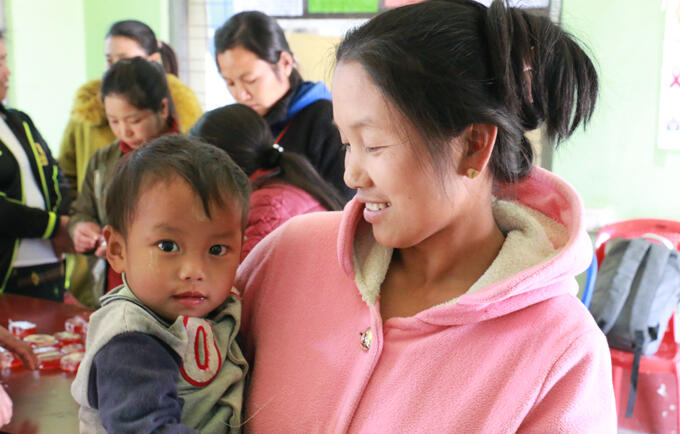SHAN, Myanmar - “My husband and I fought most of the time. He yelled at me to mind women business only and to obey him.”
A bitter smile reflects as Seng Pan* recalls. Many women like Seng Pan are trapped in a vicious cycle of limited opportunities, poverty and soaring inequalities in internally displaced persons (IDP) camps in Kutkai, just as in as many other camps in northern Myanmar. Women who are displaced by armed conflict become more vulnerable due to a loss of stability. Domestic and other gender-based violence increases during displacement as families come under pressure. Reduced income is an additional stress factor. Male family members in particular often resort to drugs and alcohol. UNFPA data indicates a very high incidence of domestic violence in families in the conflict-affected areas of northern Shan.
UNFPA supports 44 safe spaces for women in conflict areas in Myanmar. They are spaces where the voices of displaced women and girls are heard. The spaces also provide women and girls with a place in which they can take time to recover and support themselves to better understand their own needs in a safe and confidential manner.
“It took me courage to talk out loud in the first time, but I’ve become more comfortable and I feel safe. I don’t think I could share my family problems if men were in the room. Certainly not”, says Hkawn Naw*, gazing at the safe space kitchen as voices and laughter of dozens women fill the air round the stove.
UNFPA’s gender-based violence programme enables and empowers Hkawn Naw and her friends to listen to one another and reach out for help and services, including psychosocial support and counselling. The programme also builds vocational skills, such as making shampoo, soap, lotion and balms when women and girls gather once a week at the building in downtown Kutkai in northern Shan.
Domestic violence is not a private matter
Domestic violence is often considered a private matter, which increases shame and stigma of women who seek help. Women in Myanmar are struggling to find a voice to break the silence in society. This is despite the fact that many women are in despair, especially displaced women need help the most.
Zaung Yan, a caseworker at one of IDP camps in Kutkai shares the nightmarish experience of a woman that she met during awareness session in safe space: “She stood up in the crowd of women and said how terrified she is right now. Her husband, who has been expelled from the camp for drug use and disorderly behavior, forces her to have sex with him outside of camp at night. Her eyes were calling for help”. Zaung Yan’s voice tails away as if she can feel the woman’s pain. For families, life in IDP camps can spiral out of control. Displaced people are forced to live in small tents where women find themselves at high risks to both physical and mental health abuse by their spouse.
It’s been five years since Zaung Yan became a caseworker to help displaced women and girls in Kutkai. She gives them access to gender-based violence response services, including referral to health and legal support. She also provided psychosocial support and information about women’s rights in the safe space. Her big smile and interactive approach allow women unleash their long held sufferings, and to seek help.
“The safe space means a lot to me and women in the camp. The more women get access to information about their health and rights, the more they are empowered to seek help. Women have had enough suffering. Domestic violence isn’t a secret to be kept within”, says Zaung Yan.
In rural areas, many women’s responsibilities are limited to giving birth and looking after children. But when crisis and trauma hits and people are displaced, family dynamics change and community support and protection structures unravel. The women-friendly spaces in northern Myanmar, supported by UNFPA, weave strength into the fabric of displaced women and families. They build awareness about gender equality and women’s rights, and they embolden female participation in the camp community.
Names are changed for safety and privacy reasons*


